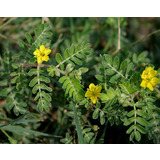Tribulus

Author: Herbs of Gold Date Posted:3 January 2014
Tribulus (Tribulus terrestris) has a long history of traditional use for a number of health conditions in men and women across various cultures around the world including those from Bulgaria and India.
Bulgarian Tribulus has been used in Eastern European folk medicine for increased muscle strength, sexual potency, infertility and to reduce impotence, whereas Indian Tribulus has a well- established traditional use in Ayurvedic medicine as a tonic and aphrodisiac.
Steroidal saponins of Tribulus
Tribulus contains the steroidal saponin protodioscin, considered to be the main component responsible for the herb’s therapeutic effect on libido and sexual functioning. Interestingly, the country of origin and plant part used reveal significant differences in the composition of these saponins. Plant material from Bulgaria is naturally much higher in protodioscin than plant material from India.
Bulgarian Tribulus is clinically trialled
Bulgarian Tribulus is the only Tribulus that has been clinically trialled, using extracts that have been standardised to contain 34mg-100mg or 40% of protodioscin. If you’re looking for Bulgarian Tribulus, you should look for Tribulus that uses the aerial parts (herb) of the plant. If a product lists the ingredient as Tribulus terrestris fruit – it will be Indian Tribulus, not the clinically trialled Bulgarian Tribulus.
Therapeutic effect of Tribulus
Tribulus has a therapeutic effect on both men and women. Tribulus steroidal saponins appear to bind with empty receptors within the hypothalamus of the brain, possibly left empty by low levels of testosterone in men and oestrogen in women. Tribulus increases luteinising hormone (LH) activity which prompts the body to produce more testosterone or oestrogen, helping to balance, but not over-stimulate, hormone levels. LH therefore has a positive effect on libido in both men and women.
Tribulus may be beneficial for:
Men:
- Male infertility due to poor sperm parameters: clinical studies show increases in sperm concentration, sperm motility and velocity.
- Improving erectile function, libido and male menopause by indirectly increasing testosterone in males.
- Clinical studies show improved libido and improved erectile function in impotent men.
- Improving muscle size and strength in body builders.
Women:
- Increases FSH (follicle stimulating hormone) and oestrogen in women. FSH stimulates follicle maturation during the first half of the menstrual cycle leading to increased oestrogen production.
- Menopause: hot flushes, sweating, insomnia, depression and anxiety.





